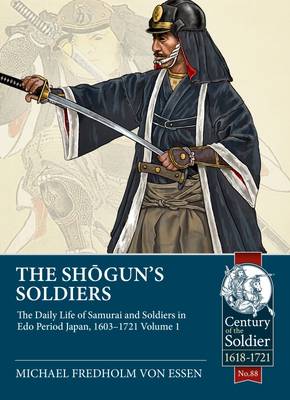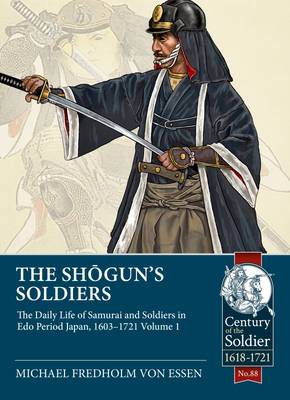
- Afhalen na 1 uur in een winkel met voorraad
- Gratis thuislevering in België vanaf € 30
- Ruim aanbod met 7 miljoen producten
- Afhalen na 1 uur in een winkel met voorraad
- Gratis thuislevering in België vanaf € 30
- Ruim aanbod met 7 miljoen producten
Zoeken
The Shogun's Soldiers
Volume 1 - The Daily Life of Samurai and Soldiers in EDO Period Japan, 1603-1721
Michael Fredholm Von Essen
€ 55,95
+ 111 punten
Uitvoering
Omschrijving
Tokugawa Ieyasu's decisive victory at Sekigahara in 1600 concluded the civil wars, confirmed his position of military supremacy as shogun (generalissimo) of Japan, and inaugurated the Edo period (1600-1868), so named because Ieyasu after the battle established his capital in Edo (modern-day Tokyo). By then, Japan was an advanced, outward-looking country.
Previously preoccupied by internal warfare, Tokugawa-ruled Japan was unified, strong, and technologically developed to a degree inferior to Europe only in certain sciences, such as shipbuilding and artillery. Japan was technologically superior in some disciplines, including the production of firearms, an import the Japanese had mastered very quickly. Japanese traders, mercenaries, and adventurers were a common sight in South-East Asia. There were flourishing Japanese overseas colonies, especially in the Philippines, Siam (now Thailand), and Java. One Japanese merchant-adventurer even managed to set himself up as a minor king in southern Siam.
Japan was a strong military power as well. The armies of Japan were a match for any enemy, well-armed and with considerable combat experience. However, the government of Japan in 1635 retreated into enforced seclusion, a seclusion aided by the geographical situation of the Japanese islands. The seclusion laws were rigorously enforced.
As the age of enlightenment, the industrial revolution, and the subsequent global expansion of the European nations transformed the world, Japan chose isolation and stagnation. A major reason for this policy decision was military weakness. The Tokugawa army under Ieyasu had been numerically large, experienced, and well-equipped, but since then, things had changed. Having defeated their enemies early in the century, the shogunate warriors settled down in castle towns. Many Tokugawa retainers settled permanently in Edo. There they soon lost the military edge they once had enjoyed.
After 1615, the shogun's soldiers were no longer needed for war. Technically, there was no demobilization. However, with no more wars to fight, the shogun's soldiers in all but name became townsmen. They retained samurai status but were no longer called up to fight. Yet, a Tokugawa army of sorts still existed.
This book describes the organization, arms, armor, dress, and daily life of samurai, soldiers, and commoners in Edo-period Japan. Occasionally, the shogunate military had to intervene, mostly against bandits but also during more serious military incidents, including conspiracies against the shogunate. Moreover, the shogun's soldiers had to assume a major role in law enforcement and firefighting. The focus of the present book is a military and social history of how the formerly so powerful Tokugawa clan army rapidly lost its combat preparedness, and how this persuaded the Tokugawa shogunate to initiate a policy of enforced seclusion.
Previously preoccupied by internal warfare, Tokugawa-ruled Japan was unified, strong, and technologically developed to a degree inferior to Europe only in certain sciences, such as shipbuilding and artillery. Japan was technologically superior in some disciplines, including the production of firearms, an import the Japanese had mastered very quickly. Japanese traders, mercenaries, and adventurers were a common sight in South-East Asia. There were flourishing Japanese overseas colonies, especially in the Philippines, Siam (now Thailand), and Java. One Japanese merchant-adventurer even managed to set himself up as a minor king in southern Siam.
Japan was a strong military power as well. The armies of Japan were a match for any enemy, well-armed and with considerable combat experience. However, the government of Japan in 1635 retreated into enforced seclusion, a seclusion aided by the geographical situation of the Japanese islands. The seclusion laws were rigorously enforced.
As the age of enlightenment, the industrial revolution, and the subsequent global expansion of the European nations transformed the world, Japan chose isolation and stagnation. A major reason for this policy decision was military weakness. The Tokugawa army under Ieyasu had been numerically large, experienced, and well-equipped, but since then, things had changed. Having defeated their enemies early in the century, the shogunate warriors settled down in castle towns. Many Tokugawa retainers settled permanently in Edo. There they soon lost the military edge they once had enjoyed.
After 1615, the shogun's soldiers were no longer needed for war. Technically, there was no demobilization. However, with no more wars to fight, the shogun's soldiers in all but name became townsmen. They retained samurai status but were no longer called up to fight. Yet, a Tokugawa army of sorts still existed.
This book describes the organization, arms, armor, dress, and daily life of samurai, soldiers, and commoners in Edo-period Japan. Occasionally, the shogunate military had to intervene, mostly against bandits but also during more serious military incidents, including conspiracies against the shogunate. Moreover, the shogun's soldiers had to assume a major role in law enforcement and firefighting. The focus of the present book is a military and social history of how the formerly so powerful Tokugawa clan army rapidly lost its combat preparedness, and how this persuaded the Tokugawa shogunate to initiate a policy of enforced seclusion.
Specificaties
Betrokkenen
- Auteur(s):
- Uitgeverij:
Inhoud
- Aantal bladzijden:
- 341
- Taal:
- Engels
- Reeks:
Eigenschappen
- Productcode (EAN):
- 9781915070333
- Verschijningsdatum:
- 21/10/2022
- Uitvoering:
- Paperback
- Formaat:
- Trade paperback (VS)
- Afmetingen:
- 180 mm x 246 mm
- Gewicht:
- 929 g

Alleen bij Standaard Boekhandel
+ 111 punten op je klantenkaart van Standaard Boekhandel
Beoordelingen
We publiceren alleen reviews die voldoen aan de voorwaarden voor reviews. Bekijk onze voorwaarden voor reviews.











